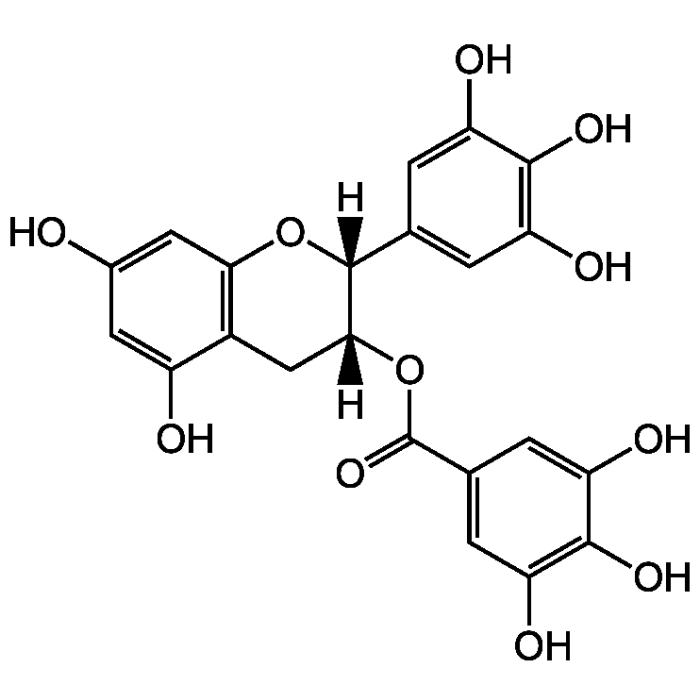Cookie Policy: This site uses cookies to improve your experience. You can find out more about our use of cookies in our Privacy Policy. By continuing to browse this site you agree to our use of cookies.
AdipoGen Life Sciences
(-)-Epigallocatechin gallate
As low as
40
CHF
CHF 40.00
In stock
Only %1 left
AG-CN2-0063-M02525 mgCHF 40.00
AG-CN2-0063-M100100 mgCHF 90.00

| Product Details | |
|---|---|
| Synonyms | Epigallocatechin-3-gallate; EGCG; CCRIS 3729; Teavigo; NVP-XAA 723 |
| Product Type | Chemical |
| Properties | |
| Formula |
C22H18O11 |
| MW | 458.4 |
| Merck Index | 14: 3526 |
| CAS | 989-51-5 |
| RTECS | KB5200000 |
| Source/Host Chemicals | Isolated from green tea. |
| Purity Chemicals | ≥98% (HPLC) |
| Appearance | Off-white to white powder. |
| Solubility | Soluble in DMSO, ethanol, dimethylformamide and water. |
| Identity | Determined by 1H-NMR and MS. |
| InChi Key | WMBWREPUVVBILR-WIYYLYMNSA-N |
| Smiles | [H][C@]1(CC2=C(O[C@]1([H])C1=CC(O)=C(O)C(O)=C1)C=C(O)C=C2O)OC(=O)C1=CC(O)=C(O)C(O)=C1 |
| Shipping and Handling | |
| Shipping | AMBIENT |
| Short Term Storage | +4°C |
| Long Term Storage | -20°C |
| Handling Advice |
Keep cool and dry. Keep under inert gas. Protect from light. |
| Use/Stability |
Stable for at least 2 years after receipt when stored at -20°C. After reconstitution, prepare aliquots and store at -20°C. |
| Documents | |
| MSDS |
 Download PDF Download PDF |
| Product Specification Sheet | |
| Datasheet |
 Download PDF Download PDF |
Description
- Potent anticancer compound.
- Anti-angiogenic. VEGF, VE-cadherin phosphorylation, matrix metalloproteinase and urokinase-plasminogen activator (uPA) inhibitor.
- Anti-inflammatory. NF-κB inhibitor. Modulates chronic inflammatory diseases, such as type 2 diabetes, rheumatoid arthritis, inflammatory bowel disease.
- COX-2 and inducible nitric oxide synthase (iNOS; NOS II) inhibitor.
- Potent antioxidant. Protects cells from lipid peroxidation and DNA damage induced by reactive free radicals.
- Regulates cancer cell growth, proliferation, transformation, survival, angiogenesis, apoptosis, invasion and metastasis.
- Chemopreventive. Apoptosis inducer. Promotes cell cycle arrest.
- Modulates signal transduction pathways including JAK/STAT, MAPK, PI3K/AKT, Wnt and Notch.
- EGFR and HER-2 receptor signaling inhibitor.
- MAPKs and activator protein-1 inhibitor.
- Potent DYRK1A inhibitor (IC50=330nM).
- mTOR suppressor.
- IGF-I signaling inhibitor.
- Proteasome inhibitor.
- Telomerase and DNA methyltransferase inhibitor.
- Selective and noncompetitive HAT inhibitor.
- Topoisomerase I and II inhibitor.
- Hedgehog signaling (Hh) modulator. PTCH and Gli1 inhibitor.
- Wnt signaling inhibitor.
- Neuroprotective. Activates HO-1 by the ARE/Nrf2 pathway, protecting neurons against oxidative damage.
- STAT-1 inhibitor.
- Shows preventive cardiovascular and metabolic (obesity, insulin resistance, hypertension and hypercholesterolemia) effects.
- Inhibits extracellular signal-related kinases (ERK), activates AMP-activated protein kinase (AMPK), modulates adipocyte marker proteins and down-regulates lipogenic enzymes as well as other potential targets.
- Fatty acid synthase (FAS) inhibitor.
- Autophagy stimulator.
Product References
- Molecular mechanisms underlying chemopreventive activities of anti-inflammatory phytochemicals: down-regulation of COX-2 and iNOS through suppression of NF-kappa B activation: Y.J. Surh, et al.; Mutat. Res. 480-481, 243 (2001) (Review)
- The specificities of protein kinase inhibitors : an update: J. Bain, et al.; Biochem. J. 371, 199 (2003)
- Targeting multiple signaling pathways by green tea polyphenol (-)-epigallocatechin-3-gallate: N. Khan, et al.; Cancer Res. 66, 2500 (2006) (Review)
- Inhibition of fatty acid synthase by polyphenols: W.X. Tian; Curr. Med. Chem. 13, 967 (2006) (Review)
- Green tea polyphenols as a natural tumour cell proteasome inhibitor: Q.P. Dou, et al.; Inflammopharmacology 16, 208 (2008) (Review)
- Chemoprevention with phytochemicals targeting inducible nitric oxide synthase: A. Murakami; Forum Nutr. 61, 193 (2009) (Review)
- Molecular basis for cancer chemoprevention by green tea polyphenol EGCG: H. Tachibana; Forum Nutr. 61, 156 (2009) (Review)
- Apoptosis by dietary agents for prevention and treatment of prostate cancer: N. Khan, et al.; Endocr. Relat. Cancer 17, R39 (2010) (Review)
- Targeting polyamines and biogenic amines by green tea epigallocatechin-3-gallate: E. Melgarejo, et al.; Amino Acids 38, 519 (2010) (Review)
- Green tea polyphenol epigallocatechin-3-gallate: inflammation and arthritis: R. Singh, et al.; Life Sci. 86, 907 (2010) (Review)
- Regulation of survival, proliferation, invasion, angiogenesis, and metastasis of tumor cells through modulation of inflammatory pathways by nutraceuticals: S.C. Gupta, et al.; Cancer Metastasis Rev. 29, 405 (2010) (Review)
- Updates of mTOR inhibitors: H. Zhou, et al.; Anticancer Agents Med. Chem. 10, 571 (2010) (Review)
- The role of nutraceuticals in the regulation of Wnt and Hedgehog signaling in cancer: F.H. Sarkar, et al.; Cancer Metastasis Rev. 29, 383 (2010) (Review)
- Use of STAT1 inhibitors in the treatment of brain I/R injury and neurodegenerative diseases: F.H. Ebner, et al.; Cent. Nerv. Syst. Agents Med. Chem. 11, 2 (2011) (Review)
- Weight control and prevention of metabolic syndrome by green tea: S. Sae-tan, et al.; Pharmacol. Res. 64, 146 (2011) (Review)
- Targeting cell signaling and apoptotic pathways by dietary agents: role in the prevention and treatment of cancer: M.K. Shanmugam, et al.; Nutr. Cancer 63, 161 (2011) (Review)
- Implications of cancer stem cell theory for cancer chemoprevention by natural dietary compounds: Y. Li, et al.; J. Nutr. Biochem. 22, 799 (2011) (Review)
- Modulation of Nrf2/ARE pathway by food polyphenols: a nutritional neuroprotective strategy for cognitive and neurodegenerative disorders: G. Scapagnini, et al.; Mol. Neurobiol. 44, 192 (2011) (Review)
- Nutritional approaches to modulate oxidative stress in Alzheimer's disease: C.B. Pocernich, et al.; Curr. Alzheimer Res. 8, 452 (2011) (Review)
- Possible involvement of programmed cell death pathways in the neuroprotective action of polyphenols: S. Bastianetto, et al.; Curr. Alzheimer Res. 8, 445 (2011) (Review)
- Green tea catechin, epigallocatechin-3-gallate (EGCG): mechanisms, perspectives and clinical applications: B.N. Singh, et al.; Biochem. Pharmacol. 82, 1807 (2011) (Review)
- Epigenetic diet: impact on the epigenome and cancer: T.M. Hardy & T.O. Tollefsbol; Epigenomics 3, 503 (2011) (Review)
- Green tea EGCG, T cells, and T cell-mediated autoimmune diseases: D. Wu, et al.; Mol. Aspects Med 33, 107 (2012) (Review)
- Epigallocatechin-3-gallate, a DYRK1A inhibitor, rescues cognitive deficits in Down syndrome mouse models and in humans: R. De la Torre, et al.; Mol. Nutr. Food Res. 58, 278 (2014)
- Comparative Efficacy and Selectivity of Pharmacological Inhibitors of DYRK and CLK Protein Kinases: M.F. Lindberg, et al.; J. Med. Chem. ahead of print (2023)









